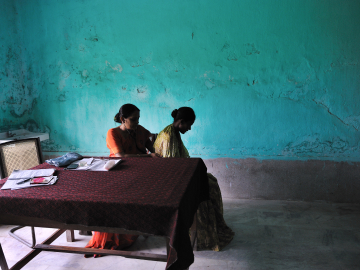Decolonizing Global Health: Reform Your NGO
Can an NGO reverse course and actively decolonize? ReSurge International did, flipping its focus from meeting the training needs of US surgical residents to helping in-country surgeons and health workers serve their patients.
In this Q&A, Jeff Whisenant, current ReSurge president and CEO, and Natalie Meyers, chief program officer, share how it happened, and what it takes to keep the effort going.
What brought about the change from a traditional fly-in medical mission to a training program?
JW: 2 people were key. Shankar Man Rai, a Nepali surgeon, was a visionary. He not only wanted to treat patients, he also wanted to train a team. David Dingman, our chief medical officer for research, met with Shankar and realized there was a much more efficient way [to provide services], basically building local capacity to meet the need year-round rather than sporadic episodic trips to provide care.
What does it take for an organization to make such a fundamental change?
NM: It takes respect and humility, knowing what you don't know, and listening. Knowing that we're really not the experts. The main role that we need to play is as a conduit in terms of resources and exchange. If you want longevity as an organization, it's a necessity to be having these conversations.
JW: We try to be thoughtful. We try to be respectful. We try to be a good partner. We try to listen. We try to engage. We try to hear the perspectives of patients. We try to hear the perspectives of trainees who are our partners in partner organizations. And being a respectful partner means recognizing their talent and their skills and what they bring to the table and saying, how can we work together in this mission?
Is it sustainable?
NM: If we were to go away tomorrow, Shankar Rai has an entire residency program and group. That’s what we're trying to replicate in a lot of countries that have zero reconstructive surgeons or just one or two.
There’s a growing interest in decolonizing global health. Why do you think that’s happening?
NM: It’s gained a lot of momentum with what’s been happening in the US around Black Lives Matter and so many racial issues here. Many people in global health and global development consider ourselves equity workers. I think current events have stimulated more thinking and action.
Why have surgeons from low-income countries train surgeons in other low-income countries?
NM: It’s way more beneficial. The US surgeon may be telling them, ‘Hey, you need to go get an MRI and an X-ray,” but they might not have that available. A surgeon from a low-income country would know to ask.
How much farther do you have to go?
JW: We very much see ourselves on a journey, an incomplete journey. Tanzania, a country of 60 million people, just got its first reconstructive surgeon. There should be 600. And there should be training programs that are generating future generations. There is a long way to go, and the need is massive.
More views on decolonizing global health here.
Join the 50,000+ subscribers in 170+ countries who rely on Global Health NOW summaries and exclusive articles for the latest public health news. Sign up for our free weekday newsletter, and please share the link with friends and colleagues.




